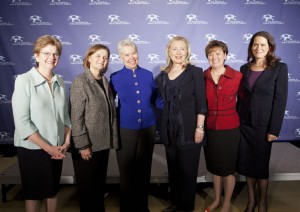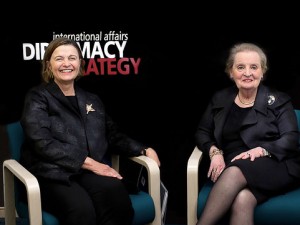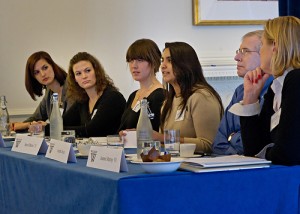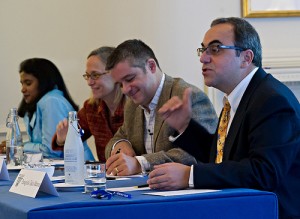On behalf of all of us at Wellesley College, I wanted to share a little “Snowflake 101.”
Warm Wellesley wishes to all of you!
On behalf of all of us at Wellesley College, I wanted to share a little “Snowflake 101.”
Warm Wellesley wishes to all of you!
Clinton, Albright, Lagarde, Steinem.
These are just a few names that have become synonymous with extraordinary leadership – women who made the commitment to shaping a better world, and whose efforts have led to a world that is newly open for more women to lead. And there are so many more. Last week, more than 700 of those women gathered with Secretary Hillary Clinton ’69 and the Women in Public Service Project’s founding partner colleges—Wellesley, Barnard, Bryn Mawr, Mount Holyoke, and Smith. We joined together to kick off our collaborative effort to foster the world we envision: a world in which political and civic leadership is 50 percent female by 2050.
 Presidents, faculty, students and other representatives from the sister colleges convened in Washington D.C. to help the Secretary launch the project. Some of the world’s most influential women joined us: Madeleine Albright ’59, the first woman to serve as U.S. Secretary of State; Christine Lagarde, Managing Director of the International Monetary Fund; Florence Chenoweth, Liberia’s first female Minister of Agriculture; Gloria Steinem, prominent author and activist; Valerie Jarrett, White House Senior Advisor and Chair of the White House Council on Women and Girls; and Afitete Jahjaga, the first female President of Kosovo.
Presidents, faculty, students and other representatives from the sister colleges convened in Washington D.C. to help the Secretary launch the project. Some of the world’s most influential women joined us: Madeleine Albright ’59, the first woman to serve as U.S. Secretary of State; Christine Lagarde, Managing Director of the International Monetary Fund; Florence Chenoweth, Liberia’s first female Minister of Agriculture; Gloria Steinem, prominent author and activist; Valerie Jarrett, White House Senior Advisor and Chair of the White House Council on Women and Girls; and Afitete Jahjaga, the first female President of Kosovo.
The Project is gaining momentum and support and was covered by CNN, Bloomberg News, and USA Today.
I mentioned in my interview with USA Today that as a scientist, I see our efforts to be like dropping a seed crystal onto a Petri dish. A seed crystal is a small beginning, but when you drop it into the right environment, it will spread rapidly, creating many new crystals. Our conviction is that by providing emerging young leaders with the tools, the networks, the training, and the support they need to lead, the process will self-perpetuate, enabling more and more strong women leaders to emerge.
We, the founding partners, see this as only the beginning. We expect many others to be involved. I hope other institutions and individuals will step up to the challenge and join us in investing in the leadership potential of women all over the world.
 I’ve just returned from an inspirational weekend in London, where I had the pleasure of hosting about 150 incredible Wellesley women who came from 13 countries for two days of exchange and dialogue, as well as a chance to reconnect with the College and each other.
I’ve just returned from an inspirational weekend in London, where I had the pleasure of hosting about 150 incredible Wellesley women who came from 13 countries for two days of exchange and dialogue, as well as a chance to reconnect with the College and each other.
One of our most distinguished alumnae, Madeleine K. Albright ’59 joined us as our special guest, and she shared her extraordinary insight on the increasing role that women are playing in advancing democracy. I had the opportunity to talk about the expanded role that I believe Wellesley will play in this complex century, and about the contributions that our graduates can and will make toward shaping our shared future all around the world.
 All European alumnae were invited for opportunities to network with each other, hear from Wellesley’s faculty about current global issues, as well as learn from the perspectives and experiences of recent Wellesley graduates. The discussions were lively and impassioned. There was a panel about the powerful impact of social media on world affairs by Wellesley and London School of Economics faculty, which was moderated by Carla Robbins ‘74, Deputy Editorial Page Editor of the New York Times. Four recently graduated Wellesley Albright Fellows gave an illuminating panel presentation of their experience at Wellesley and following graduation. Both panels and the audience discussion afterwards were examples of the exchange of brilliant Wellesley minds at work. I loved being there to hear it.
All European alumnae were invited for opportunities to network with each other, hear from Wellesley’s faculty about current global issues, as well as learn from the perspectives and experiences of recent Wellesley graduates. The discussions were lively and impassioned. There was a panel about the powerful impact of social media on world affairs by Wellesley and London School of Economics faculty, which was moderated by Carla Robbins ‘74, Deputy Editorial Page Editor of the New York Times. Four recently graduated Wellesley Albright Fellows gave an illuminating panel presentation of their experience at Wellesley and following graduation. Both panels and the audience discussion afterwards were examples of the exchange of brilliant Wellesley minds at work. I loved being there to hear it.
 The past weekend is only the beginning of our efforts to expand Wellesley’s global presence—and to celebrate our connections with alumnae around the globe. It was also confirmation that Wellesley women are ready and able to address the international challenges that face us all—in large part, by engaging with each other, by putting their minds together, and by inspiring each other to develop the world’s next big innovative and multidisciplinary solutions.
The past weekend is only the beginning of our efforts to expand Wellesley’s global presence—and to celebrate our connections with alumnae around the globe. It was also confirmation that Wellesley women are ready and able to address the international challenges that face us all—in large part, by engaging with each other, by putting their minds together, and by inspiring each other to develop the world’s next big innovative and multidisciplinary solutions.
(Photo credit: Bill Knight)